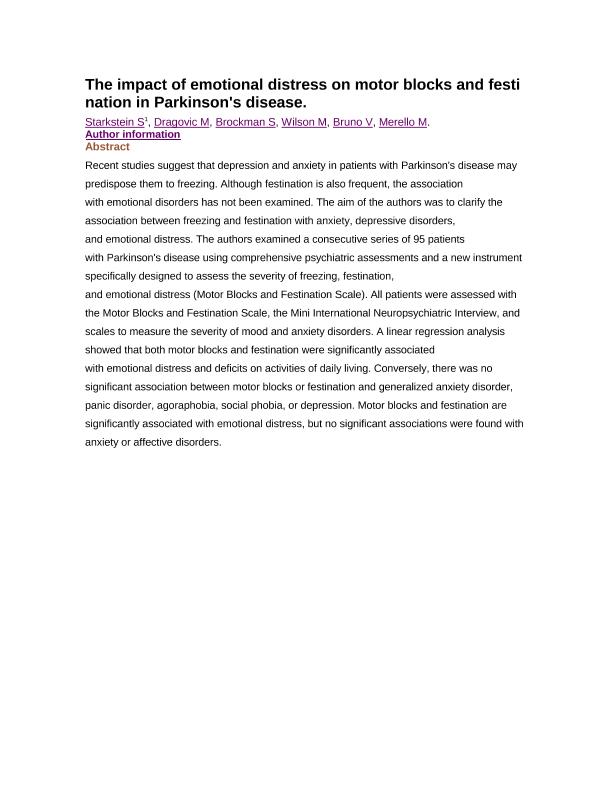Mostrar el registro sencillo del ítem
dc.contributor.author
Starkstein, Sergio
dc.contributor.author
Dragovic, Milan
dc.contributor.author
Brockman, Simone
dc.contributor.author
Wilson, Mark
dc.contributor.author
Bruno, Veronica Andrea

dc.contributor.author
Merello, Marcelo Jorge

dc.date.available
2020-08-26T15:12:43Z
dc.date.issued
2015-06
dc.identifier.citation
Starkstein, Sergio; Dragovic, Milan; Brockman, Simone; Wilson, Mark; Bruno, Veronica Andrea; et al.; The impact of emotional distress on motor blocks and festination in parkinson’s disease; American Psychiatric Publishing, Inc; The Journal Of Neuropsychiatry And Clinical Neurosciences.; 27; 2; 6-2015; 121-126
dc.identifier.issn
0895-0172
dc.identifier.uri
http://hdl.handle.net/11336/112442
dc.description.abstract
Recent studies suggest that depression and anxiety in patients with Parkinson´s disease may predispose them to freezing. Although festination is also frequent, the association with emotional disorders has not been examined. The aim of the authors was to clarify the association between freezing and festination with anxiety, depressive disorders, and emotional distress. The authors examined a consecutive series of 95 patients with Parkinson´s disease using comprehensive psychiatric assessments and a new instrument specifically designed to assess the severity of freezing, festination, and emotional distress (Motor Blocks and Festination Scale). All patients were assessed with the Motor Blocks and Festination Scale, the Mini International Neuropsychiatric Interview, and scales to measure the severity of mood and anxiety disorders. A linear regression analysis showed that both motor blocks and festination were significantly associated with emotional distress and deficits on activities of daily living. Conversely, there was no significant association between motor blocks or festination and generalized anxiety disorder, panic disorder, agoraphobia, social phobia, or depression. Motor blocks and festination are significantly associated with emotional distress, but no significant associations were found with anxiety or affective disorders.
dc.format
application/pdf
dc.language.iso
eng
dc.publisher
American Psychiatric Publishing, Inc

dc.rights
info:eu-repo/semantics/openAccess
dc.rights.uri
https://creativecommons.org/licenses/by-nc-sa/2.5/ar/
dc.subject
PARKINSON S DISEASE
dc.subject
FREEZING OF GAIT
dc.subject
FESTINATION
dc.subject
MOOD AND ANXIETY
dc.subject.classification
Neurología Clínica

dc.subject.classification
Medicina Clínica

dc.subject.classification
CIENCIAS MÉDICAS Y DE LA SALUD

dc.title
The impact of emotional distress on motor blocks and festination in parkinson’s disease
dc.type
info:eu-repo/semantics/article
dc.type
info:ar-repo/semantics/artículo
dc.type
info:eu-repo/semantics/publishedVersion
dc.date.updated
2020-08-25T15:18:03Z
dc.journal.volume
27
dc.journal.number
2
dc.journal.pagination
121-126
dc.journal.pais
Estados Unidos

dc.journal.ciudad
Washington DC
dc.description.fil
Fil: Starkstein, Sergio. University of Western Australia; Australia
dc.description.fil
Fil: Dragovic, Milan. University of Western Australia; Australia
dc.description.fil
Fil: Brockman, Simone. University of Western Australia; Australia
dc.description.fil
Fil: Wilson, Mark. University of Western Australia; Australia
dc.description.fil
Fil: Bruno, Veronica Andrea. Fundación para la Lucha contra las Enfermedades Neurológicas de la Infancia; Argentina. Consejo Nacional de Investigaciones Científicas y Técnicas; Argentina
dc.description.fil
Fil: Merello, Marcelo Jorge. Consejo Nacional de Investigaciones Científicas y Técnicas; Argentina. Fundación para la Lucha contra las Enfermedades Neurológicas de la Infancia; Argentina
dc.journal.title
The Journal Of Neuropsychiatry And Clinical Neurosciences.

dc.relation.alternativeid
info:eu-repo/semantics/altIdentifier/doi/http://dx.doi.org/10.1176/appi.neuropsych.13030053
dc.relation.alternativeid
info:eu-repo/semantics/altIdentifier/url/https://neuro.psychiatryonline.org/doi/10.1176/appi.neuropsych.13030053
Archivos asociados
